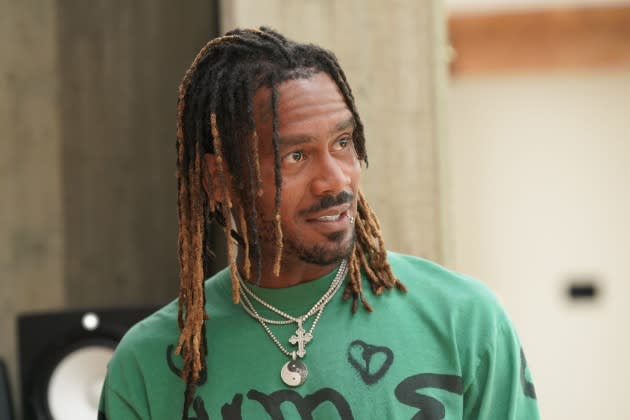Don’t Forget About GaTa: How the ‘Dave’ Star’s Cathartic Role Let Him Both Entertain and Inspire

On “Dave,” a show co-created by and starring Dave Burd that dramatizes his exploits as terminally navel-gazing hip-hop star Lil Dicky, there can be little room to explore the lives of others in his orbit. But since the 2020 pilot, Davionte “GaTa” Ganter has not-so-quietly been stealing scenes as Burd’s hype man and closest confidante.
Not only has GaTa become the sounding board and best friend that everyone wishes they had (whether they’re a famous rapper or not), he has offered an intimate window into his own mental health struggles, reenacting them on screen with devastating vulnerability.
More from Variety
'Dave' Star Christine Ko on Emma's Documentary Betrayal and Why Lil Dicky Hasn't Released New Music
'Dave' Star GaTa on the Show's Mental Heath Spotlight: 'Dicky Encouraged Me to Share My Story'
As tough as his journey has often been to watch throughout the series, GaTa says that performing heavy scenes comes naturally. This is despite the fact he has no prior acting experience. “It’s easy for me to get emotional,” he says. “And I’m also a Cancer, and they say we’re emotional people.”
Early on in “Dave,” GaTa reveals that he suffers from bipolar disorder, charting the history of his severe mood swings through flashbacks from the time before he became part of Lil Dicky’s crew. Particularly for a Black man trying to gain a foothold in a professional community that frequently prizes confidence and machismo, simply being willing to tell the story at all felt like a risk, but GaTa lends his journey a hard-won poignancy — and a power in sharing it with the people closest to him.
“The most difficult thing for me to do is actually be able to accept the fact that I’m going to be sharing this very personal information that’s so dear to me, because I’ve got an image to uphold,” he admits. “I want to be the cool guy. So for me to be able to break down and let people know I get depressed, I get weak at times, was very challenging.”
In Season 3, GaTa further chronicles his journey in episodes like “Hearsay,” where he is forced to confront a lifelong friend who takes advantage of his newfound fame, and “The Storm,” where his womanizing on tour leads to a fight between two groupies — and eventually a revelation about what drives his struggle to manage healthy romantic relationships. Like with his bipolar disorder, these plot details came from actual experiences — an approach to storytelling that started on the show with Burd and was encouraged by his friend and collaborator.
“I didn’t always have it easy. I had some trauma in my life growing up, not knowing my real mom and my real dad,” GaTa says. “But Dicky encouraged me to share my story because he told me that I would be inspiring people and motivating people — and that’s my desire as a true entertainer, as an artist, to inspire people.”
Yet GaTa’s performance on the show isn’t simple recreation, even if its verisimilitude lends these scenes an undeniable authenticity: “People know that we pull from real pieces of our lives, but at the same time, it’s still acting. I like the fact that we get to put real moments in there, [but] we know what’s true and we know what’s not true.”
His natural presence and growing versatility have led to other opportunities in other films, including Sanaa Lathan’s “On the Come Up” and Will Gluck’s “Anyone but You.” However much he’s “playing himself,” there’s clearly something about him that people cannot get enough of.
“I know there are people that know that I’m not a real actor,” says GaTa. “I’m just ready to perform and I’m just passionate because I always want to be an artist. I always want to be entertaining.”
Best of Variety
Sign up for Variety’s Newsletter. For the latest news, follow us on Facebook, Twitter, and Instagram.
